|
De Duitse schrijver en feuilletonist Heinz Knobloch werd op 3 maart 1926 in Dresden geboren. Zie ook alle tags voor Heinz Knobloch op dit blog.
Uit: Geisterbahnhöfe
Es konnte die stehengebliebene, anbefohlene Dekoration sein zum gerade noch vom Volk gestatteten 40. Jahrestag der Deutschen Demokratischen Republik. So sah sie aus im Schaufenster und hätte vielleicht noch die Leser geärgert einen Monat später. Jetzt aber erfreute das Schaufenster.
Wegen dieser Darbietung bisher kaum beachtet. Nun aber stand da ein Kärtchen, gut sicht- und lesbar auf einem Glasträger in der Mitte und lautete schlicht »Alles umsonst«.
Es könnte als Kernwort stehen neben: »Wir sind das Volk«.
»Alles umsonst« galt auch für die geschlossenen und abgesperrten Bahnhöfe auf Ostberliner Gebiet. Alle Mühe war umsonst gewesen. Sie hatte nur viel gekostet. Nicht bloß Geld, wie wir wissen.
Wenn von Reisefreiheit die Rede war, oder dieser Gedanke jahrelang unausgesprochen in vielen Köpfen lebte, dann meinte man in Berlin zunächst das Nutzen sämtlicher Verkehrsmittel.
Kaufte man einen Stadtplan in der »Hauptstadt der DDR«, dann gab es neben der Hauptstadt eine Art Niemandsland, weiß gelassen, nein frei gelassen im feinsten Doppelsinne. Nur ein paar Bächlein waren eingezeichnet.
Und wer wußte von den Bahnlinien unter der volkseigenen Erde? Gelegentlich erschienen sie als westliches Fernsehbild zum Wundern.
Wer dabei war muß erzählen.
.

Heinz Knobloch (3 maart 1926 24 juli 2003)
Cover
De Griekse dichter en schrijver Alexandros Papadiamantis werd geboren op 3 maart 1851 in Hora op het eiland Skiathos. Zie ook alle tags voor Alexandros Papadiamantis op dit blog.
Uit: The Seals Dirge (Vertaald door Peter Constantine)
Beneath the cliff where the waves spray and the path from Mamoyiannis's windmill descends lies the cemetery, and the area to the west, where the shore juts out and the village urchins swim from morning to night all summer long is called Kohili, "shell," as it has the shape of a shell. Toward evening old Loukena, a poor, death-singed woman, came down the path carrying a bundle of clothes under her arm, to wash the woolen blankets in the salty waves and then rinse them in the small fountain of the brackish waters that trickle from the slate rock face and empties calmly into the waves. She walked slowly, down the path, down the slope, singing a mournful dirge in a whispering voice, raising her hand to shade her eyes from the glare of the sun setting behind the mountain across the water, its rays caressing opposite her the small enclosure and the tombs, bleached, whitewashed, shining in the sun's last blaze. She thought of the five children she had buried one after the other in that threshing floor of death, that garden of decay, many years ago when she was still young. Two girls and three boys, all in their infancy. Ravenous death had scythed them down. Death finally seized her husband too, and she was left only two sons, who had moved to foreign lands. One, she had been told, had gone to Australia. He had not sent a letter in three years. She had no idea what had become of him. The other, the younger, traveled the Mediterranean on ships, and still remembered her from time to time. She was also left a daughter, married now with half a dozen children.
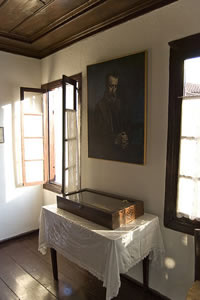
Alexandros Papadiamantis (3 maart 1851 3 januari 1911)
Papadiamantis Museum op Skiathos
De Oostenrijks-Amerikaanse schrijver Charles Sealsfield (eig. Carl Postl) werd geboren op 3 maart 1793 in Znojmo. Zie ook alle tags voor Charles Sealsfield op dit blog.
Uit: Die Prärie am Jacinto
»Und warum soll es nicht?« fragte wieder eine Stimme.
»Ich gebe die Frage zurück, Sir! Warum soll es?«
»Es ist ein integrierender Teil Louisianas.«
»Um Vergebung! Seht den Bericht der Kommissäre bei Abschluß des Ankaufes Louisianas und der Zession Floridas an, und ihr werdet finden, daß Frankreich nie in den Sinn kam, den Rio del Norte anzusprechen, und daß Spanien, bloß um vor euch Ruhe zu haben, eure Ansprüche durch Florida befriedigte. Ihr seid in jeder Hinsicht vollkommen zufriedengestellt.«
»Er ist kein Bürger«, murmelten wieder die einen.
»Wer ist er?« die anderen.
»Ein kecker Bursche auf alle Fälle«, die dritten.
»Und wer«, schrie wieder die heftige Stimme, »und wer wer hat Texas bevölkert? Wem hat es seine Unabhängigkeit zu verdanken als uns, den südlichen Staaten, seinen Nachbarn?«
»Ah, das ist eine andere Frage, Oberst Oakley, aber ich glaube, Nachbarschaft und Konvenienz entscheiden hier doch nicht allein.«
»Und was entscheidet, General Burnslow?« fielen nun ein Dutzend Stimmen ein, »wer soll entscheiden? Wer? Der Norden? Sollen wir uns vom Norden vorschreiben lassen?«
»Vom alten Weibe Adams?« schrien die einen.
»Oder dem langweiligen Webster?«
»Oder dem pedantisch schulmeisterlichen Everett?«
»Weder von dem einen noch dem andern, sondern vom südländischen Gerechtigkeitssinne, der da sagt: Wir haben kein Recht auf Texas!« sprach der General.
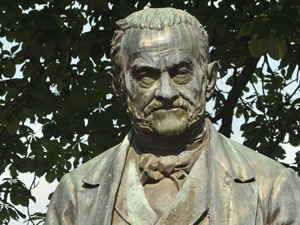
Charles Sealsfield (3 maart 1793 26 mei 1864)
Beeld in het Národní park Podyjí bij Znojmo.
De Engelse schrijver, journalist, econoom en politiek filosoof. William Godwin werd geboren in Wisbech in Cambridgeshire op 3 maart 1756. Zie ook alle tags voor William Godwin op dit blog.
Uit: Italian Letters
The breast of my Rinaldo swells with a thousand virtuous sentiments. I am conscious of this, and I will not disgrace the confidence I ought to place in you. But your friend cannot but be also sensible, that you are full of the ardour of youth, that you are generous and unsuspecting, and that the happy gaiety of your disposition sometimes engages you with associates, that would abuse your confidence and betray your honour.
Remember, my dear lord, that you have the reputation of a long list of ancestors to sustain. Your house has been the support of the throne, and the boast of Italy. You are not placed in an obscure station, where little would be expected from you, and little would be the disappointment, though you should act in an imprudent or a vicious manner. The antiquity of your house fixes the eyes of your countrymen upon you. Your accession at so early a period to its honours and its emoluments, renders your situation particularly critical.
But if your situation be critical, you have also many advantages, to balance the temptations you may be called to encounter. Heaven has blessed you with an understanding solid, judicious, and penetrating. You cannot long be made the dupe of artifice, you are not to be misled by
the sophistry of vice. But you have received from the hands of the munificent creator a much more valuable gift than even this, a manly and a generous mind. I have been witness to many such benevolent acts of my Rinaldo as have made my fond heart overflow with rapture. I have traced
his goodness to its hiding place. I have discovered instances of his tenderness and charity, that were intended to be invisible to every human eye.
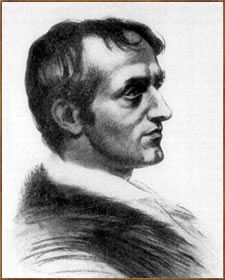
William Godwin (3 maart 1756 - 7 april 1836)
De Franse schrijver Paul Guimard werd geboren op 3 maart 1921 in Saint-Mars-la-Jaille. Zie ook alle tags voor Paul Guimard op dit blog.
Uit: Les choses de ma vie mimportent plus que ma carriere (Interview met Jean-Paul Liegeois)
PAUL GUIMARD. Oui, un chapitre du « Mauvais Temps » est consacré à la mer. Mais dans tous mes romans précédents il n'en est pas question. On a vite fait de se faire coller une étiquette dans le dos. Quand j'ai publié « les Faux Frères», j'ai été l'écrivain du métro. Avec « Rue du Havre », je suis devenu l'écrivain de la gare Saint-Lazare. Avec « les Choses de la vie », l'écrivain de la route. Je ne suis rien de tout cela. Je suis écrivain, j'écris sur des sujets qui me passionnent. Je ne suis pas non plus un écrivain de la mer. C'est dans ma vie quotidienne que la mer a une grande place, pas dans mes livres. Pour la télévision, j'ai voulu faire ce qu' Evelyne Sullerot a appelé « une uvre-pont ». C'est-à-dire essayer de faire entrer des gens dans un monde qu'ils ne connaissent pas. Je connais par cur le monde de la pêche, j'ai beaucoup navigué avec des marins. Dans la marge étroite qui est concédée aux écrivains à la télévision, j'ai voulu faire découvrir aux téléspectateurs l'univers des pêcheurs au chalut, leur travail et leur vie. Six films d'une heure ont été tournés en Bretagne, sur un chalutier : quelle joie I J'espère avoir réussi à faire partager mon plaisir. Quant à « l'Empire des mers », c'est un livre sur une minorité, sur une dimension particulière de la vie de la mer. C'est le monde des gagneurs, de ceux qui veulent arriver avant les autres. Ils font leur course autour du monde sur un voilier, parce qu'ils ne connaissent que le bateau. Ils le font admirablement : c'est une aventure dingue, dangereuse à un point que le novice ne peut imaginer. En cela, ils sont plus près du pilote de « formule 1 » que du marin ou du plaisancier. Mais je n'ai jamais été tenté personnellement par une expérience aussi folle.
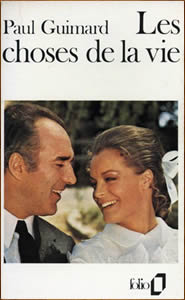
Paul Guimard (3 maart 1921 2 mei 2004)
Cover
De Engelse dichter en politicus Edmund Waller werd geboren in Coleshill, Buckinghamshire op 3 maart 1606. Zie ook alle tags voor Edmund Waller op dit blog.
On Tea
Venus her myrtle, Phoebus has her bays;
Tea both excels, which she vouchsafes to praise.
The best of Queens, and best of herbs, we owe
To that bold nation, which the way did show
To the fair region where the sun doth rise,
Whose rich productions we so justly prize.
The Muse's friend, tea does our fancy aid,
Repress those vapors which the head invade,
And keep the palace of the soul serene,
Fit on her birthday to salute the Queen.
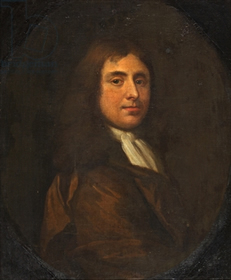
Edmund Waller (3 maart 1606 21 oktober 1687)
Portret door Sir Godfrey Kneller
De Engelse dichter en schrijver Thomas Otway werd geboren op 3 maart 1652 in Trotton, bij Midhurst. Zie ook alle tags voor Thomas Otway op dit blog.
Uit: Venice Preserved
SCENE I. A STREET IN VENICE.
_Enter Priuli and Jaffier._
_Pri._ No more! I'll hear no more! Be gone and leave me.
_Jaf._ Not hear me! By my suffering, but you shall! My lord, my lord! I'm not that abject wretch You think me. Patience! where's the distance throws Me back so far, but I may boldly speak In right, though proud oppression will not hear me?
_Pri._ Have you not wrong'd me?
_Jaf._ Could my nature e'er Have brook'd injustice, or the doing wrongs, I need not now thus low have bent myself To gain a hearing from a cruel father.
Wrong'd you?
_Pri._ Yes, wrong'd me! In the nicest point, The honour of my house, you've done me wrong.
You may remember (for I now will speak, And urge its baseness) when you first came home
From travel, with such hopes as made you look'd on, By all men's eyes, a youth of expectation,
Pleas'd with your growing virtue, I receiv'd you; Courted, and sought to raise you to your merits: My house, my table, nay, my fortune too, My very self, was yours; you might have us'd me To your best service; like an open friend I treated, trusted you, and thought you mine:
When, in requital of my best endeavours, You treacherously practis'd to undo me.
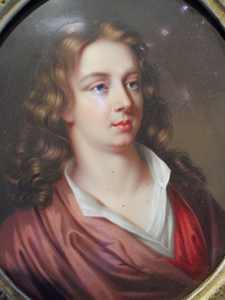
Thomas Otway (3 maart 1652 14 april 1685)
Portret door Henry Pierce Bone
03-03-2013 om 20:45
geschreven door Romenu 
Tags:Heinz Knobloch, Alexandros Papadiamantis, Charles Sealsfield, William Godwin, Paul Guimard, Edmund Waller, Thomas Otway, Romenu
|

